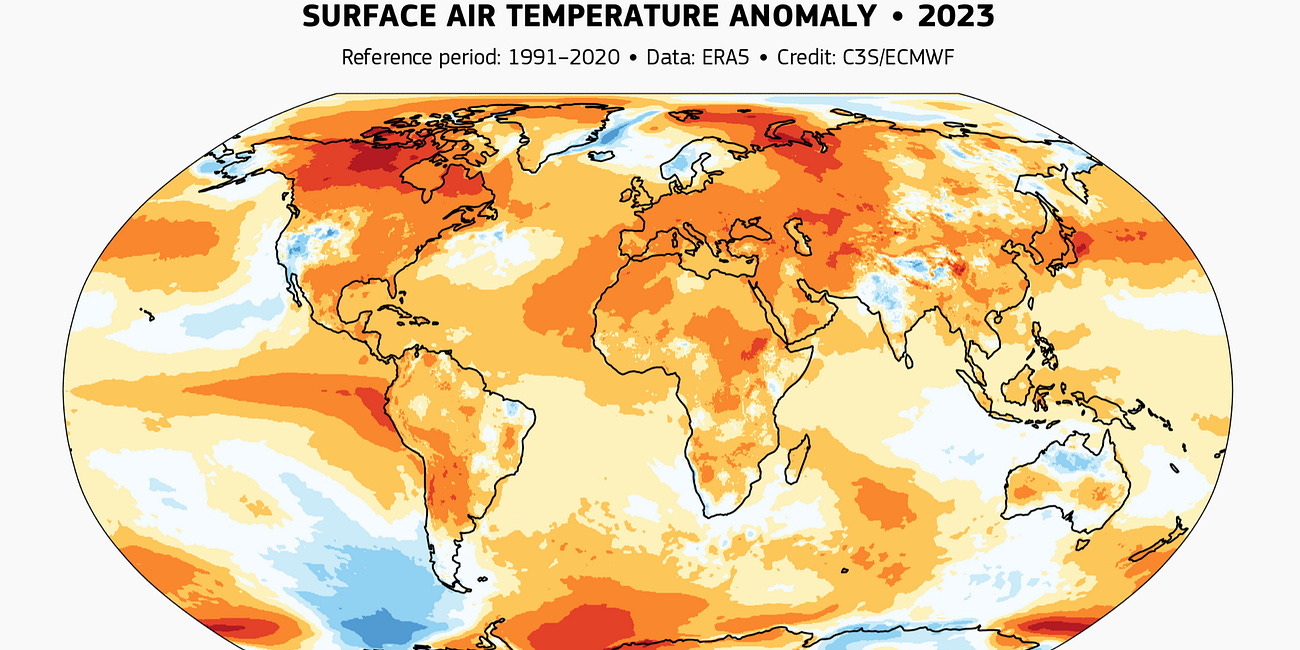Four of the five most severe global risks on the ten-year horizon are environmental. This is one of the conclusions of the World Economic Forum’s Global Risks Report 2024.
The key to addressing these risks is cooperation on urgent global issues. However, two-thirds of international experts whose insights form the basis for the annual report anticipate a multipolar or fragmented order; it will be characterized by competition among middle and great powers to establish and enforce new rules and norms.
As frequently highlighted in this newsletter, there is a notable absence of the global leadership required to address a spectrum of environmental and other pressing challenges. Postponing collective action only exacerbates the issues, contributing to heightened geopolitical tensions and conflicts, further diminishing the likelihood of cooperation on global matters.
The top five risks identified in the report are extreme weather events, critical changes to earth systems, biodiversity loss and ecosystem collapse, natural resource shortages, and misinformation and disinformation.
The identified risks pose a significant threat to progress in human development, with the report highlighting a gradual erosion of adaptive capacity amid shifts in global power dynamics, climate, technology, and demographics.
The report recommends a reevaluation of global risk response strategies, emphasizing the need for leaders to focus on swiftly establishing guardrails against emerging risks. Specific areas of concern include agreements addressing the integration of artificial intelligence in conflict decision-making.
Not all activities require cross-border cooperation; the report explores actions that can enhance resilience at the individual and state levels. Initiatives such as digital literacy campaigns on misinformation and disinformation aim to fortify against these threats. The report suggests fostering research and development on climate modeling and technologies to expedite the energy transition, with contributions from both the public and private sectors.
This is the 19th Global Risk Report; none of them has been light reading material. I read most of them when they were published each year in January and noticed how the risk perceptions have changed towards more environmental issues. In the first one, risks like weapons of mass destruction, the situation in the Middle East, and terrorism ranked high in the report. Climate change was the only ecological issue recognized as a risk, but the respondents differed widely in their perception of climate change impacts.
It looks like progress in recognizing the importance of global environmental challenges that this year, four of the five most severe global risks on the ten-year horizon are environmental in nature. However, expert respondents disagreed regarding the urgency of these risks. While private sector respondents anticipate a more extended timeframe for ecological risks to materialize, civil society and government stakeholders emphasize the growing threat of reaching a point of no return.
I guess that a year from now, when the 2025 report comes out, those private sector respondents will have seen a year of unprecedented environment-related disasters that may finally convince them of the utmost urgency to act and that civil society and government stakeholders are right to emphasize the growing threat of reaching a point of no return.
If you love this newsletter, get value out of it, and believe in paying people for their work, consider a paid subscription.
Paris Reinvented: A 15-Minute City's Journey to Urban Sustainability
Paris has made impressive progress in the past decade towards becoming a green, sustainable city. Air pollution has been significantly reduced, and a range of measures in transportation and local governance has remarkably improved the city's livability. (The photos in this article are from last week's very short trip to Paris.)
2023: A Climate Odyssey
It's official: 2023 was the warmest year ever measured; no surprises in Copernicus' announcement. But just because we all knew this news would come, it's essential to write about it. And that is because the news cycle is never kind to slow-moving processes, however deadly.
The Threats and the Beauty: a Few Words on the Concept of This Newsletter
Dear Friends, This newsletter is about two aspects of life on this planet: it deals with the threats to life on our planet and celebrates the beauty of life on this planet. The Planet is a reader-supported publication. To receive new posts and support my work, consider becoming a free or paid subscriber.










"We have gotten past the stage where we are to be pardoned if we simply treat any part of our country as something to be 'skinned' for two or three years for the use of the present generation. Whether it is the forests, the water, the scenery, whatever it is, handle it so that your children's children will get the benefit." Wise words from President Roosevelt speaking in 1903 about the unparalled beauty of the Grand Canyon. His words seem to have fallen on deaf ears as 120 years later we are reaping the consequences of "skinning" the earth for man's benefit. As the beauty, mystery and loneliness of the Grand Canyon tell us, "Leave it as it is. Man can only mar it."
The guardrails have come off and this train is on a dangerous crash course. Thank you, Alex, for consistently sounding the alarm bell. Like a scene from Ferris Buehler's Day Off: "Life moves pretty fast, if you don't stop and look around once in a while, you could miss it." Let's stop and look around. Let's not miss it.
I agree when you write that « …those private sector respondents will have seen a year of unprecedented environment-related disasters that may finally convince them of the utmost urgency to act and that civil society and government stakeholders are right to emphasize the growing threat of reaching a point of no return. »
Some responsive action of a few industries is on the go... but it’s timid and faces many contradictors and hurdles.